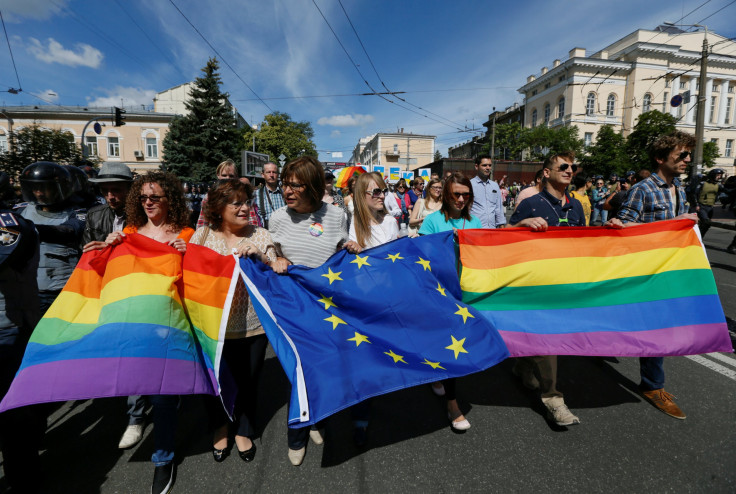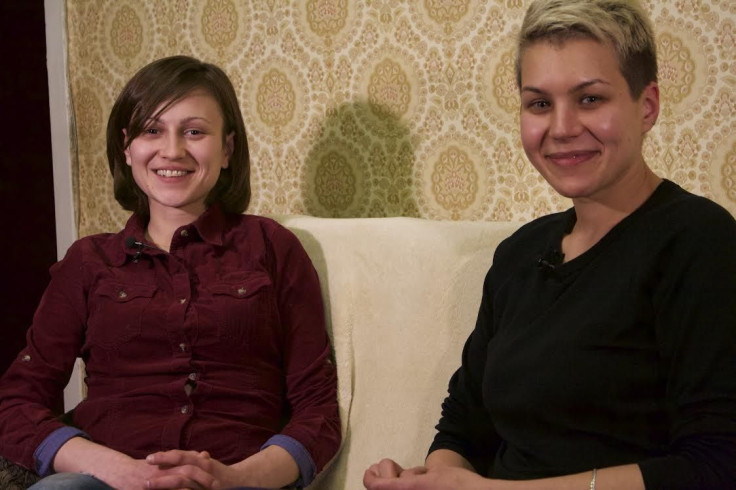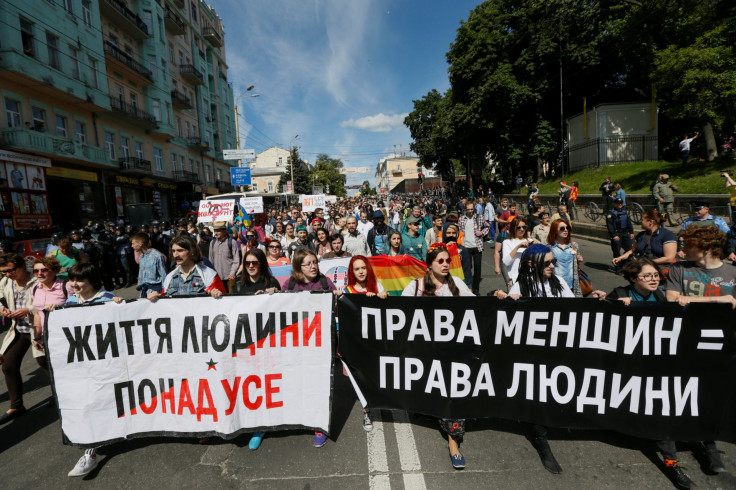Amid Battle With Pro-Russian Separatists, Ukraine Accused Of LGBT Discrimination Despite Promises To European Union

KIEV, Ukraine -- Marina Lemischenko and Marina Kostetska were excited to be starting a new life together outside the Ukrainian capital of Kiev after they managed to flee the war waged by pro-Russian separatists in the eastern part of the country. Yet even after seeming to find safety and freedom, the two Marina's have discovered they face a different kind of battle -- against discrimination.
Both about 30 years old, the women have been lesbian partners for more than five years.
Although the highly Westernized government in Kiev claimed in its pursuit of European Union membership that it respected LGBT rights, both women said they still must be very careful in public because of possible retribution for being in a same-sex relationship.
“On the street, we can hold hands and kiss each other,” said Lemischenko, 29. “But quickly, so that we don’t draw attention to ourselves,” finished Kostetska, 31, who said she can’t be open with her sexuality at work.

Members of the LGBT community in Ukraine said they have faced discrimination in many forms. That’s a deep disappointment to many leaders of the 2014 Ukrainian Revolution, also known as the “Revolution of Dignity” or Euromaidan Revolution, named for the Kiev square where the uprising that was at times violent started with protests by thousands of people.
The revolution sought to remove a corrupt government closely allied with Russia, protect human rights and improve Ukraine’s ties with Europe. But three years later, many of the social reforms promised by the new government that would take power have failed to take hold. Amid the country’s failure to uphold its vow to expand LGBT rights, activists and members of the LGBT community who participated in the revolution have become frustrated by the slow pace of social progress.
“It’s very sad, but also fascinating to see that in a country of 45 million people, you don’t know almost anyone who’s openly gay. And if you know them, they’re LGBT rights activists,” said Maxim Eristavi, one of the only openly gay public figures in Ukraine.
On the first day of the revolution, Eristavi co-founded the independent television network Hromadske International to provide an alternative to state-run media. While the revolution was a moment of hope for gay rights, Eristavi said traditional stigmas and institutionalized homophobia have persisted.
“When it comes to Ukraine, we’re not talking about gay marriage at the moment, [or] full constitutional equality, for instance,” he said. “We’re talking about basic things to protect us from violence that is not punishable, that is not being recorded.”
Lemischenko and Kostetska fled their home in the Eastern Ukrainian city of Lugansk in 2015. As two of the 1.7 million Ukrainians displaced by war, they said they're lucky to have found a relatively safe, quiet place to live on Kiev's outskirts. But that luck didn't extend to their sexuality Discrimination against gay and transgender people in Ukraine have made life difficult and sometimes risky for them and other members of the LGBT community despite a 2015 anti-discrimination law that was added to Ukraine’s labor code, protecting employers’ gender identity and sexual orientation.
Still, many have been refused work or housing in Ukraine because of their sexual orientation. When the couple first arrived in Kiev, far from friends and family, they had no place to stay. They eventually found refuge at an LGBT shelter in Ukraine — a four-bedroom apartment run by a nonprofit called Insight, which houses migrants from the warzone, Russian-occupied Crimea and people facing difficult living situations at home for up to three months.
“There was absolutely no one to turn to and Insight really helped us,” Lemischenko said. “First, they gave us a roof over our heads. Then they told us where we could find work.”
The Insight shelter was the only one in Ukraine specifically for the LGBT community, said head coordinator Olga Olshanskaya. However, it was struggling financially and has received no funding from the state.
“All of our projects are financed by donor organizations from Europe or America,” she said. “We understand that not a single party in Ukraine supports LGBT rights.” One political party called Democratic Alliance has become an advocate for the community, but it didn't hold seats in parliament.

Fearing stigmatization, discrimination and hate crimes, the homosexual and transsexual population in Ukraine has remained largely undercover.
There hasn't been any data recorded on how many people in the country identify as gay, lesbian, bisexual or transgender, according to Andrii Maymulakhin, the head coordinator of Nash Mir, a national LGBT advocacy group based in Kiev. Maymulakhin has estimated that in any human society, about four percent of men are exclusively homosexual in their lifetimes. That was about one in every million Ukrainians.
But a lack of census data for the LGBT community in Ukraine paled in comparison to the other challenges posed for the group.
“The transgender people we have in the shelter either didn’t work or weren’t able to find a job because their appearance didn’t match the picture on their documents,” Olshanskaya said. “Employers don’t hire them.”
Ukraine has been struggling to balance national identity and European values. Insight has monitored hate crimes and discrimination as well as advocates for legislative changes to protect the LGBT community. The organization of five members came up against the traditional value system in Ukraine, a country in which 70 percent of people identify as Orthodox Christian. What’s more, a wave of nationalism spread through the country after the revolution and reached extremes among some of the 15,000 pro-Ukrainian volunteers who have been fighting in informal battalions in the East. These battalions have often been affiliated with the far-right and neo-Nazi groups that oppose LGBT rights.
Because members of battalions were volunteering in the war, they could easily evade Ukrainian laws against attacks on LGBT people.
Once veterans return home, “they can dictate whatever they want to see in ‘their’ city,” said Insight founder Olena Shevchenko. “They’re above the law, or they are the law.”
In 2016, Insight planned an Equality Festival to promote tolerance and civil rights for social groups in the western city of Lviv. Unlike the gay rights pride parade in Kiev which passed without incident, the festival was canceled at the last minute by a local court with little explanation. In front of their hotel, festival goers were met with crowds of masked right-wing protesters, some throwing rocks. In the end, the LGBT activists were evacuated by bus because of a bomb threat.
Threats of violence at the festival and elsewhere have prompted many LGBT activists to feel that their own society and government don’t protect them, or even work against them.
“Our politicians are much more liberal and tolerant when they go abroad and are speaking to an international audience and much less vocal on LGBT rights in the country, in Ukraine,” said Maymulakhin.
To Maymulakhin and others at Nash Mir, the ongoing war with pro-Russian separatists, as well as continued economic downturn, have given the government excuses to push back on civil reform.
In spite of the 2015 anti-discrimination law, government support for civil rights has remained largely rhetorical. Volodymyr Groysman, the Chairman of the Ukrainian Parliament—and now Prime Minister of Ukraine—expressed his disapproval of LGBT rights in November 2015 after the legislation was introduced.
“We stand for family values in Ukraine,” Groysman told parliament. “I hear false reports that same-sex marriage will be made legal in Ukraine. God forbid that this ever happens. We will never support it.”
Only a few individual and younger members of parliament, like Svitlana Zalishchuk, have advocated for LGBT rights.
“If we are serious about what we are talking about, then let’s start with human rights, including LGBT rights, because this is how it’s working in European countries—those countries we are trying to integrate with,” Zalishchuk said.
However, Eristavi said he believes Ukrainian politicians are not ready to fight for the LGBT community. “People tell me, we’re not against the issue, but let’s wait 20 or 30 years,” he said. “I cannot wait 30 years to have a normal life.”
Far from the warzone, with a new apartment and new jobs, Lemischenko and Kostetska echoed Eristavi’s words, but said that they have hope for the future of Ukraine.
“We don’t want to leave our country, so we can be part of building a new country as we want to see it—one completely open for society, where politicians work for the people, where there’s no bribery, when there’s no discrimination against religious or race, or for belonging to the LGBT community,” Lemischenko said.
This article and video were produced through the GlobalBeat program at New York University’s Arthur L. Carter Journalism Institute. Credits: Natasha Bluth, Correspondent; Veda Shastri and Rahmah Pauzi, Videographers; Jason Maloney, Professor; Barclay Palmer, Executive Producer.
© Copyright IBTimes 2025. All rights reserved.





















